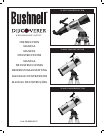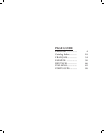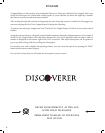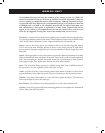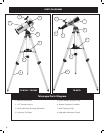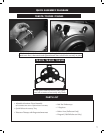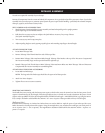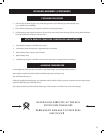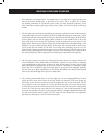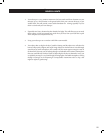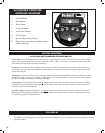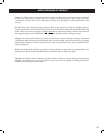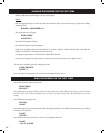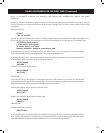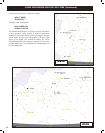
8
DETAILED ASSEMBLY
No tools are required for assembly of your telescope.
Remove all components from the carton and identify all components. It is a good idea to lay all the parts out in front of you before
assembly. Since your telescope is a precision optical system the parts require careful handling—particularly the onboard computer,
telescope, eyepieces, and various accessory lenses.
SET UP TRIPOD AND ACCESSORY TRAY
1. Stand Discoverer Computerized Star Locator Assembly and attached tripod legs in the upright position.
Spread tripod legs to a comfortable distance.
2. Fold down the accessory tray braces and place the Quick Release Accessory Tray on top of braces.
(See Quick Assembly Diagram)
3. Turn accessory tray until it snaps into place.
4. Adjust tripod leg height to suit by opening tripod leg lever and extending tripod legs to desired height.
ATTACH TELESCOPE TUBE
1. Locate Main Telescope Tube.
2. Remove Telescope Tube Thumb Nuts from side of Telescope Tube.
3. Position Main Telescope Tube Attachment Bolts through Telescope Tube Bracket at the top of the Discoverer Computerized
Star Locator Assembly. (Logo on telescope tube should be right-side up.)
4. Reattach Telescope Tube Thumb Nuts to Main Telescope Tube Attachment Bolts once Main Telescope Tube and Discoverer
Computerized Star Locator Assembly are assembled together.
ATTACH FINAL TELESCOPE ACCESSORIES
1. Locate Red Dot Finderscope.
NOTE: The large end of the finderscope should face the open end of telescope tube.
2. Attach Low Power Eyepiece.
3. Tighten all set screws to secure accessories.
SELECTING AN EYEPIECE
You should always start viewing with the lowest power eyepiece, which in this case is the 20 mm lens. Note: the base power of each
eyepiece is determined by the focal length of the telescope objective lens. A formula can be used to determine the power of each
eyepiece: telescope OBJECTIVE lens focal length divided by EYEPIECE focal length = MAGNIFICATION (e.g. Using the 20 mm
lens, a sample calculation could look like this: 500 mm / 20 = 25x or 25 power. Telescope models will vary in focal length.)
(Reflectors Only)
Included with this telescope is a Barlow lens. Barlow lenses are used to double or triple the power of your telescope. Place your
Barlow between the focusing tube and the eyepiece. Using the example above, your 3x Barlow lens would give you a total power of
75x or 75 power. (25 x 3 = 75x or 75power). The magnification calculation would look like this: 500 mm /20mm = 25 power. 25
power x 3=75 power.



